Do you ever wonder what your kids are learning at preschool when it seems like they’re just playing all day? The good news is that if they’re playing, they’re learning!
Learning during the first 6 years is about building skills through play. Maria Montessori said, “Play is the work of the child” and many theorists such as Piaget and Vygotsky agreed on its importance. [source]
This does not only apply to babies and toddlers. Preschoolers learn through play when using their whole body and engaging the senses.
A good preschool will give your children a well-rounded, holistic education through a balance of free play and well-planned, adult-guided play.
So, what do kids learn in preschool? Here are 16 of the most important foundational skills children develop in the preschool years (and my ready-to-use play pack can help with all of these).
There’s also a printable of these skills at the end of this post.
1. Gross Motor Skills
Physical development starts with developing gross motor skills – the large muscles of the body.
At preschool, your children will be moving nonstop. Movement is the most important skill to develop first in the early years as it is necessary for all other learning.
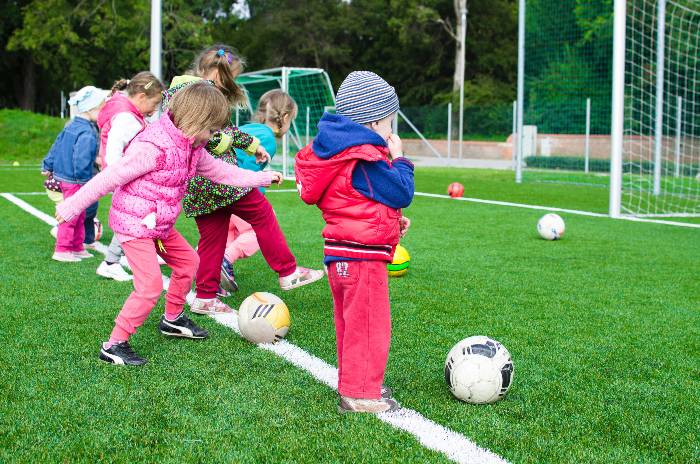
Children must develop skills such as core strength, hand-eye coordination and agility.
They also need to develop two important senses – vestibular and proprioception – responsible for balance and body awareness.
Movement is important as it stimulates learning, improves concentration, gives the brain oxygen and works both sides of the brain. Good gross motor skills also lay the foundation for fine motor skills.
Some examples of gross motor activities:
- Throwing and catching balls
- Playing hopscotch
- Singing action songs
- Playing with bean bags
- Balancing on beams
- Climbing and hanging
- Skipping and hopping
- Running and chasing games
Gross motor skills can be developed through many indoor and outdoor activities.
2. Fine Motor Skills
Fine motor coordination – the development of the small muscles – is a prerequisite to learning how to write and is necessary for performing everyday tasks.
In preschool, children spend a large portion of their day working on these skills through creative arts and play.
Children’s fine motor skills are developed through all kinds of art activities, such as:
- Drawing
- Painting
- Cutting
- Pasting
- Constructing with cardboard boxes and waste materials
They can also be developed with other fine motor activities such as:
- Pegboards
- Puzzles
- Threading and lacing
- Playing with pegs
- Playing with construction toys (Lego is great)
- sensory play, such as playing with playdough
3. Early Mathematical Concepts
Preschool is where the foundations for mathematics begin. No child ever learns maths in the first grade. The type of maths they learn just becomes more formal.
In the preschool grades children learn:
- Rote counting (such as counting up to 20)
- One-to-one correspondence (reliably counting objects)
- Classifying
- Sorting
- Length
- Capacity
- Weight
- Area
- Temperature
- Time
- Space
- Shape
These concepts are learned while having pure fun, with hands-on activities – in the sandpit, while baking, playing with water, building with blocks and even while tidying up.
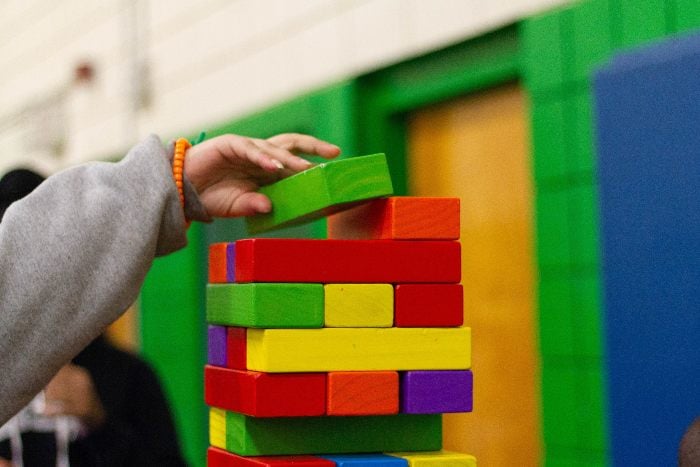
4. Problem Solving and Critical Thinking
Developing thinking skills and problem-solving skills abilities is a crucial part of early childhood education. Learning this in preschool also helps children with mathematical problem solving during the formal grades.
Problem-solving and thinking skills are built during simple activities such as:
- Construction play
- Building puzzles
- Playing board games
- Resolving problems during social play
- Playing games like Odd One Out
- Asking open-ended questions during stories
5. Language and Vocabulary
Preschool is a language-rich environment where children’s vocabulary expands dramatically. Language development is a key part of a child’s cognitive development.
Language skills include learning sentence construction, the use of grammar and tenses, the meaning of words, etc.
Language and vocabulary are learnt throughout the day while:
- Having circle time discussions.
- Singing nursery rhymes and songs.
- Playing games.
- Playing alone and with friends.
- Learning about a theme.
- Playing with toys, equipment and other materials.
- Listening to stories.
- Telling short stories.
6. Pre-Writing Skills
Writing starts with developing important pre-writing skills through play and art activities.
These four skills are specific requirements for learning to write and will be the focus during preschool:
- Pencil grip
- Crossing the midline
- Learning about letters and their formation (through play, not formal writing)
- Learning to form patterns (for example drawing big waves or zig-zags which mimic the shapes found in letters)
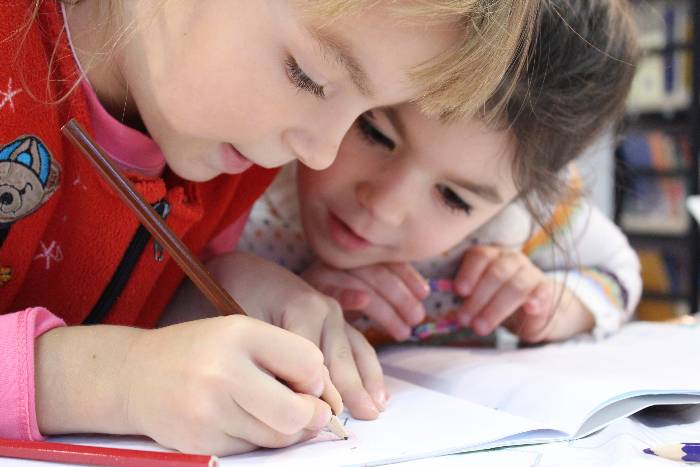
7. Listening Skills
Listening is one of the most important and often underdeveloped skills. This should be a focus area during preschool.
Children learn to listen by doing these kinds of activities:
- Listening to stories
- Playing games such as Broken Telephone or I Spy
- Following instructions
- Class discussions
- Music activities
Although your children are learning to listen at school, it is highly recommended to focus on these skills at home too. Children with good listening skills are much more successful and capable at school.
Here are some listening games you can play at home.
8. Musical Skills
Music in preschool is about so much more than just developing musical skills.
Music develops children’s:
- Vocabulary
- Understanding of rhyme, syllables and sounds
- Auditory perception
- Concentration
- Fine motor skills (finger plays)
- Gross motor skills (action rhymes)
- Mathematical skills (counting rhymes)
- decision-making skills (games such as musical chairs)
9. Visual Perceptual Skills
Visual and auditory perception are the two main building blocks of learning to read.
Children develop their visual perception during preschool with the following types of activities:
- Activities that teach about shapes and colours
- Patterning activities
- Puzzles and tangrams
- Card games
- Memory games
10. Auditory Perceptual Skills
Auditory perception is the brain’s ability to make sense of what the ears hear. It is vital for being able to learn sounds for reading.
These kinds of activities develop auditory perception:
- Reciting nursery rhymes and poems
- Playing with instruments
- Playing sound games
- Playing word games
11. Pre-Reading Skills
During preschool children develop early literacy skills, which include all the necessary pre-reading skills to set them up for learning to read formally.
Learning to read requires developing sound knowledge (auditory perception) and symbol knowledge (visual perception), as explained above.
These are the five main pre-reading skills:
- Print awareness – understanding that written words convey meaning.
- Motivation to read – exposure to books that ignites a desire to read.
- Listening comprehension – the ability to understand what is heard.
- Letter knowledge – informal exposure to letters and their sounds during play.
- Phonological awareness – being able to hear sounds in words (beginning, middle and end sounds).
Children are exposed to these kinds of activities:
- Playing rhyming games
- Playing word games
- Games involving hearing syllables
- Playing listening games
- Following instructions (single and multiple instructions)
12. Memory
At school, children also strengthen their memory, a skill they will rely on for learning throughout their education.
These are the kinds of games that are often played in preschool classes:
- Memory card games (get a printable set in my store here).
- Circle memory games such as “I went to the shops and I bought a…”. Each child has a turn to add an item, but must first recall the entire list before adding their item.
- List games such as “Categories”. Pick a category (e.g. fruits) and go around the circle asking each child to add the name of one fruit. No fruits may be said twice so children must remember which ones were already mentioned
13. Early Science Concepts
As children explore and interact with their environment and nature, they also learn about early science concepts.
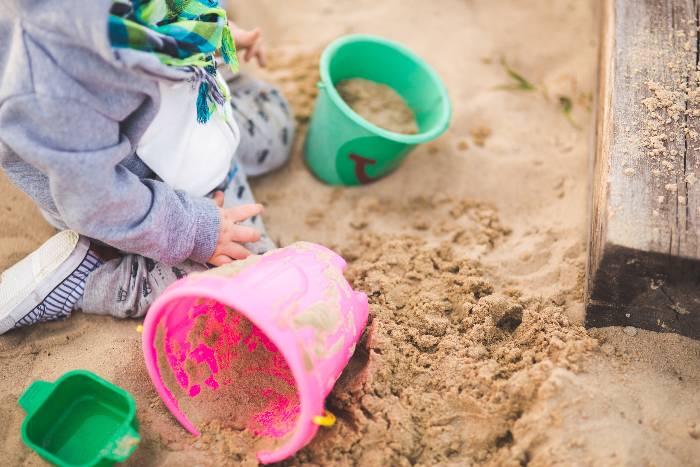
A great example is learning about physics by discovering the properties of water during water play:
- Water makes sand heavier.
- Water influences the texture of sand.
- Water falls through space (e.g. through a sieve).
- Air (wind) moves water.
- Water is a liquid because it pours.
- Water takes the shape of the container it is poured into.
14. Social-Emotional Skills
Social and emotional growth is as crucial to child development as physical and intellectual growth are and should form part of a preschool curriculum.
Social development is about learning communication skills, building healthy relationships and interacting appropriately with others.
Through daily social interactions, children learn important social skills such as:
- Taking turns
- Sharing
- Considering the opinions of others
- Showing empathy
- Cooperating and negotiating
- Resolving conflicts
- Leading and following
- Creating and following rules in games to encourage positive interaction
Emotional development includes building skills such as:
- Self-awareness
- Expressing emotions in a healthy way
- Emotional intelligence
- Empathy
15. Creative Expression
Preschool is where a child’s creative spark can really be ignited.
There are many opportunities throughout the school day where children develop their creative expression:
- During art activities – painting, constructing, drawing
- Musical activities – dancing, singing and playing with instruments
- Playing with construction toys
- Drama and puppet play
- Telling stories
- Fantasy/ dress-up play
- Outdoor play (e.g. building forts)
16. Independence
Last but perhaps most importantly, the greatest takeaway for young children at preschool is their growing independence.
Children learn to take care of themselves and show a sense of responsibility and a desire to be competent.
There are endless opportunities for teaching kids independence:
- Regular tidy-up times
- Taking accountability for actions
- Looking after belongings (shoes, bags, books, etc.)
- Self-care (going to the bathroom, washing hands, etc.)
- Making choices throughout the day (during free play or activities with choice)
And there you have it. That is certainly not a complete list as your kids are learning so much but that is more or less a summary of what skills a preschooler should have and what good preschools should be focusing on.
Here is a detailed school readiness checklist if you’d like to delve into each developmental area more.
The 16 Most Important Things Kids Learn in Preschool
Notes
Here are 16 of the most important foundational skills children develop in the preschool years.
1. Gross Motor Skills
Physical development starts with the large muscles of the body. At preschool, children are constantly moving, which builds strength, coordination and body awareness.
Gross motor activities include:
- Throwing and catching balls
- Playing hopscotch
- Singing action songs
- Balancing on beams
- Climbing, hopping and skipping
Movement stimulates learning, improves concentration, and lays the foundation for fine motor skills.
2. Fine Motor Skills
Fine motor coordination—the small muscles in the hands and fingers—is necessary for everyday tasks and for writing later on.
Activities that develop these skills include:
- Drawing, painting and cutting
- Threading and lacing
- Puzzles and pegboards
- Playdough and sensory play
- Construction toys such as Lego
3. Early Mathematical Concepts
Maths foundations are built long before formal lessons begin. Preschoolers explore concepts like:
- Counting and one-to-one correspondence
- Sorting and classifying
- Length, weight, capacity and area
- Shape and space
- Time and temperature
These skills develop naturally during play with blocks, sand, water and everyday routines.
4. Problem Solving and Critical Thinking
Thinking skills grow through activities such as puzzles, board games, construction play and resolving social play conflicts. Open-ended questions and games like Odd One Out also strengthen these abilities.
5. Language and Vocabulary
Preschool is a language-rich environment where vocabulary expands rapidly. Children learn through circle time, songs, stories, discussions and play. They practise sentence structure, grammar, and the meaning of words.
6. Pre-Writing Skills
Writing begins with pre-writing foundations:
- Pencil grip
- Crossing the midline
- Learning letter shapes informally through play
- Pattern-making (zig-zags, waves, loops)
These skills develop naturally through drawing, painting and large motor movements.
7. Listening Skills
Listening is essential for success in school. Children practise it through stories, class discussions, following instructions, and games such as I Spy or Broken Telephone.
8. Musical Skills
Music supports far more than rhythm. It develops vocabulary, rhyme awareness, concentration, fine and gross motor skills, auditory perception and even maths skills through counting rhymes and patterns.
9. Visual Perceptual Skills
Visual perception supports reading readiness. Preschoolers build these skills with puzzles, memory games, card games, and activities involving shapes, colours and patterns.
10. Auditory Perceptual Skills
Auditory perception—the brain’s ability to interpret sounds—is key to learning to read. Children develop it through nursery rhymes, sound games, word play and listening activities.
11. Pre-Reading Skills
Preschoolers develop early literacy foundations:
- Print awareness
- Motivation to read
- Listening comprehension
- Letter knowledge
- Phonological awareness
Activities include rhyming, listening games, storytime, and playful exposure to letters and sounds.
12. Memory
Games such as memory cards, Categories and “I went to the shops” strengthen memory skills that children will rely on for learning throughout their schooling years.
13. Early Science Concepts
Through play and exploration, children discover scientific principles. Water play, for example, teaches about weight, texture, air movement and liquids. Outdoor exploration builds curiosity and observation skills.
14. Social-Emotional Skills
Preschool is a key time for learning social and emotional growth. Children practise:
- Taking turns and sharing
- Showing empathy
- Negotiating and cooperating
- Managing feelings and building self-awareness
These skills prepare them to build positive relationships.
15. Creative Expression
Art, music, drama, storytelling and fantasy play encourage children to express themselves and develop imagination, creativity and problem-solving.
16. Independence
Perhaps most importantly, preschool nurtures independence. Children learn to:
- Take care of belongings
- Tidy up
- Practise self-care routines
- Make choices during free play
This growing sense of responsibility and competence prepares them for school and beyond.
And there you have it—a snapshot of what preschoolers are learning every day through play. For a deeper look at developmental areas, check out this detailed school readiness checklist.
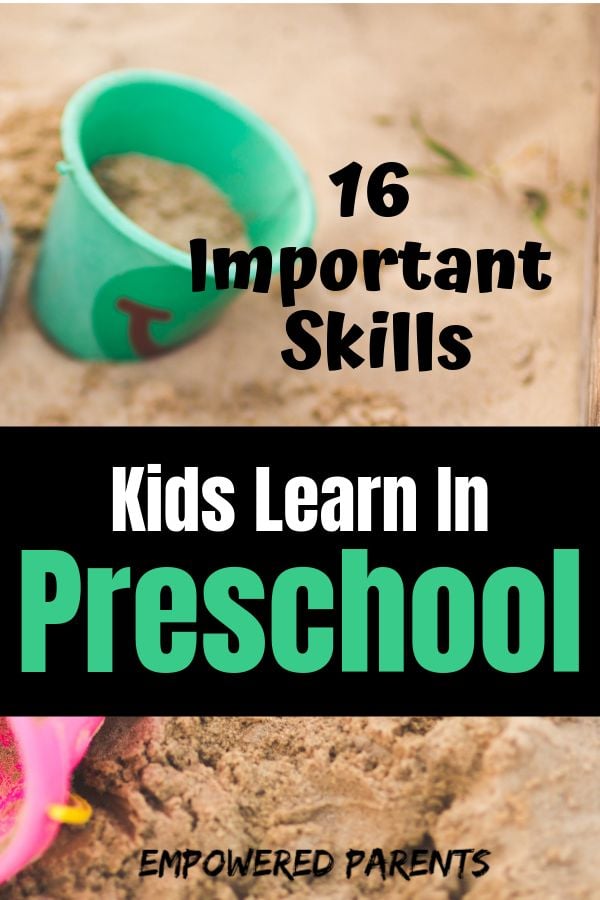
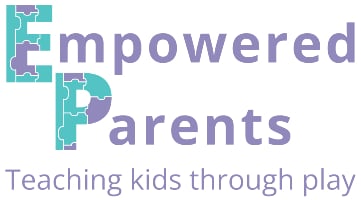
Gilbert Herithier
Friday 22nd of July 2022
Hello, whaou, I've never thought that was what my children should learn or are learning at their preschool, and I've never found important sending my children through the preschool I've been seeing it, as a waste of time and money, now that I know these things I'm considering sending them at preschool, and I'll make sure to enforce all of the things you've been spoken through this post.
Thank you so much.
Tanja Mcilroy
Tuesday 26th of July 2022
Thanks for reading and sharing your thoughts.
Teacher Gemma-Lyn
Monday 11th of April 2022
Thank you so much for your very useful and helpful website now I can start next week my tutorial lessons for my pre-kinder student. For me, I think it's complete for my tutee to study all that I will teach him as a Review so he can cross being a Kindergarten student. Getting him ready for the next grade! :-) <3
Tanja Mcilroy
Tuesday 12th of April 2022
I'm glad you found this website helpful!
Arunima
Sunday 6th of March 2022
Amazing information I got from this
L. Fisher
Tuesday 13th of October 2020
So comprehensive, this is really useful Tanja. I’m a volunteer primary teacher just starting to teach ESL in a very small nursery and my training in teaching pre-school was many, many years ago now, so thank you for reminding me of all the reasons why we should be delivering a well-planned play-based pre-school curriculum over teaching formal skills before the children are developmentally ready.
Tanja Mcilroy
Thursday 15th of October 2020
You're welcome! I'm glad you found this resource useful.
Kristien Bahumi
Wednesday 30th of September 2020
I am going to use it in my class ,this is very helpfull infomation